Completed evaluations
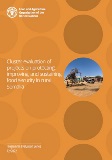
Cluster evaluation of projects on protecting, improving, and sustaining food security in rural Somalia
06/12/2022
FAO Somalia delivered a good at-scale cash programme in a very difficult operating environment. Significant attention needs to be paid to chronic issues such as delays in time-critical inputs, linkages with resilience activities, centralized programme design, an inhibiting “service provider” partnership model and IT systems that need to be strengthened to provide necessary information on reporting, traceability, trend and anomaly detection.

Evaluation of FAO’s Multi-Country Programme in the Pacific Islands
06/12/2022
This evaluation assessed the strategic relevance and contribution of FAO in the Pacific region in responding to national/subregional needs and challenges within areas of FAO’s mandate. It covered the period from January 2018 to December 2021, aligning with the start date of the current Country Programming Framework. The evaluation identified lessons learned and recommendations to inform the planning of FAO’s future engagement in the subregion.

Ex-post evaluation of the project "Development of Integrated Dairy Schemes in Afghanistan"
17/11/2022
This project aimed at developing the capacity of government partner agencies, cooperatives and unions, and beneficiary farming households on the management of resources and dairy sector productivity improvements. The evaluation found that FAO’s support at all levels of the milk supply chain was relevant to increasing production and productivity in the sector, increasing rural incomes, diversified livelihoods and consequently was relevant for the government’s dairy development strategy.
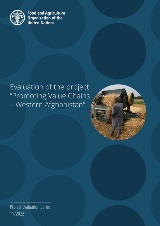
Evaluation of the project “Promoting Value Chains – Western Afghanistan"
16/11/2022
The objective of this project was to promote inclusive growth and job creation in the agricultural sector. The evaluation found that the project created an enabling environment that promoted active engagement between producers, processors, traders, input suppliers and markets.
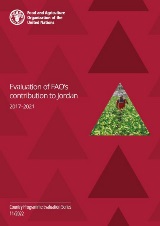
Evaluation of FAO’s contribution to Jordan 2017–2021
15/11/2022
The Jordan country programme evaluation covered the period 2017–2021. The evaluation assessed FAO's strategic positioning, operational and organizational capacity, contributions, partnerships and normative values.
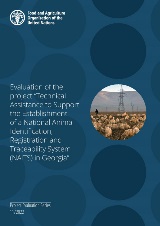
Evaluation of the project “Technical Assistance to Support the Establishment of a National Animal Identification, Registration and Traceability System (NAITS) in Georgia”
08/11/2022
This evaluation aimed to guide future actions and serve as an input to improve the implementation of the follow-up project. This evaluation presents strategic recommendations and lessons to maximize the institutionalization and appropriation of the project’s results by stakeholders and disseminate information to authorities that could benefit from it.
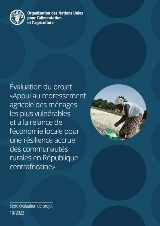
Evaluation of the project "Support for the agricultural revival of the most vulnerable households and the revival of the local economy for increased resilience of rural communities in the Central African Republic"
02/11/2022
The project is consistent with policies and programs to strengthen food and nutritional security and fits well into the humanitarian response as a whole. It has enabled many households to benefit from improved seeds and agricultural tools through direct distributions and seed fairs. It has also enabled many groups to restart their breeding activity. (French only)
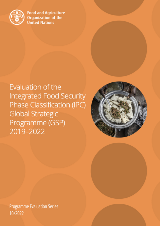
Evaluation of the Integrated Food Security Phase Classification (IPC) Global Strategic Programme (GSP) 2019–2022
10/10/2022
The evaluation reviewed the strategic direction and performance of the programme from 2019 to 2022 and makes recommendations for the future direction of the GSP in its next phase in 2023. The report explores the use and utility of the IPC, its governance, the adaptive capacity within the programme, and how equity and gender are addressed in IPC analyses.
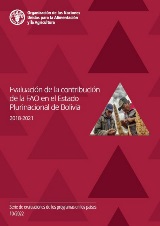
Evaluation of FAO’s country programme in Bolivia, 2018–2021
10/10/2022
This evaluation was carried out in order to provide inputs for the preparation of the new CPF by assessing the most relevant aspects of the FAO program in Bolivia during the period under review, and to provide recommendations to strengthen the strategic relevance of FAO in the country. (Spanish only)
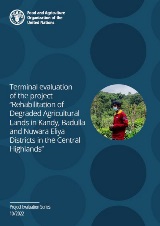
Terminal evaluation of the project “Rehabilitation of Degraded Agricultural Lands in Kandy, Badulla and Nuwara Eliya Districts in the Central Highlands”
10/10/2022
The terminal evaluation found that the project generated relevant planned and unplanned outcomes including spontaneous dissemination of project models and demand for replication and use of participatory land use development plans as national model for village level resource planning.
